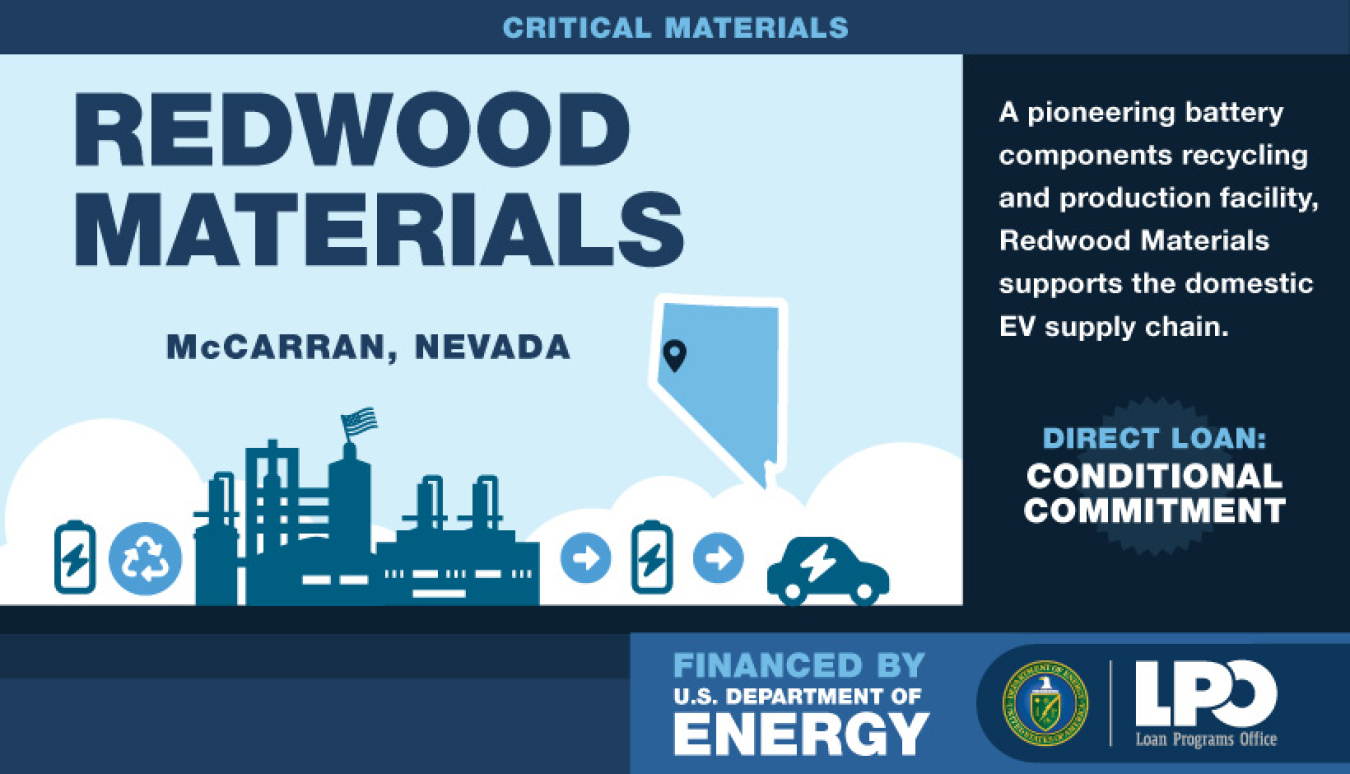
The U.S. Department of Energy’s (DOE) Loan Programs Office (LPO) today announced a conditional loan commitment of $2 billion to Redwood Materials for the construction and expansion of a battery materials campus in McCarran, Nevada that will support the growing electric vehicle (EV) market in America. Once fully operational, the project would be the first domestic facility to support production of anode copper foil and cathode active materials in a fully closed-loop lithium-ion battery manufacturing process by recycling end-of-life battery and production scrap and remanufacturing that feedstock into critical materials. Redwood Materials is expected to create approximately 3,400 good-paying construction jobs and employ approximately 1,600 full-time employees, including labor, technical staff, and on-site management. In addition, Redwood Materials will rely on a construction workforce comprised of union, Minority and/or Woman-Owned Business Enterprises in the construction of the project. LPO works with all borrowers to create good-paying jobs with strong labor standards during construction, operations, and throughout the life of the loan and to adhere to a strong Community Benefits Plan. This latest conditional commitment builds upon several recent Advanced Technology Vehicles Manufacturing (ATVM) loan announcements, including Syrah Vidalia, Ultium Cells, and Rhyolite Ridge, that support domestic manufacturing of advanced technology vehicles, qualifying components, and materials that improve fuel economy.
This project marks a significant step towards meeting the Biden Administration’s target of making half of all new vehicles sold in 2030 zero-emissions vehicles, including battery electric, plug-in hybrid electric, or fuel cell electric vehicles. At full production capacity, the project’s anode copper foil and cathode active material output is anticipated to support the production of more than 1 million EVs per year, reducing annual gasoline consumption by over 395 million gallons and avoiding more than 3.5 million tons of CO2 emissions each year. At scale, the production output from this project will play an essential role in supporting U.S. automotive manufacturers.
Redwood Materials will use both new and recycled feedstocks—comprised of critical materials like lithium, nickel, and cobalt—to produce approximately 36,000 metric tons per year of ultra-thin battery-grade copper foil for use as the anode current collector, and approximately 100,000 metric tons per year of cathode active materials. Anode copper foil and cathode active material are the two most critical and valuable components of lithium-ion battery manufacturing for EVs. Onshoring the production of these components is critical to America’s energy independence while ensuring the long-term success and sustainability of an advanced battery manufacturing industry here at home.
To date, nearly all anode and cathode production supporting U.S. battery cell manufacturers occurs in Asia. With this conditional commitment, Redwood Materials will lead one of the first domestic projects that produces cathode materials at scale for battery cell manufacturing. The project will also support a domestic, sustainable supply of anode copper foil, onshoring a key part of the critical materials supply chain as U.S. EV adoption grows exponentially. Further, this latest conditional commitment comes as the EV market in America is expected to grow substantially along with U.S. automakers and component suppliers working to lead the world in electric vehicle manufacturing. The share of annual battery-powered electric vehicles is expected to rise from about 2% in 2020 to 35% by 2030.
To meet increased demand for lithium-ion batteries, recycling will play an increasingly important role in battery materials production. On average, Redwood can recover greater than 95% of the critical battery elements in an end-of-life battery (including lithium, nickel, cobalt, manganese, and copper), and then use those metals to manufacture anode and cathode components domestically for U.S. battery cell manufacturers.
Redwood Materials’ Nevada operation recycles end-of-life batteries from consumer electronics like cell phone batteries, laptop computers, power tools, and other electronic waste, remanufacturing these feedstocks into critical components that help support the domestic lithium-ion battery supply chain. By lowering the cost of the critical materials necessary to produce lithium-ion batteries using recycled materials, electric vehicles have the potential to become more accessible and affordable to consumers. The circular supply chain supported by this project is an example of how the U.S. EV industry can support sustainable, long-term lithium-ion battery production.
Redwood Materials currently has partnerships with several existing and prospective EV battery manufacturers in the United States. These off-takers include Panasonic Energy of North America, which is located nearby at the Tesla Gigafactory and has another facility under construction in Kansas that will source Redwood Materials’ cathode and anode materials for battery cell production. Other partnerships include key U.S.-based and global automakers, domestic suppliers of end-of-life batteries and electronic waste, and others.
Proximity to battery manufacturers’ facilities will drive down logistics costs and emissions, enable faster learning cycles between battery makers and Redwood Materials, accelerate production efficiencies and reduce costs in these component technologies.
This project helps meet the goals put forth by the Biden Administration’s Executive Order 14017 on America’s Supply Chains, including the promotion of domestic critical materials recycling and manufacturing. The domestic production of these battery components is paramount to our national security, building our supply chain, and strengthening our economy long-term. Shifting the domestic critical materials supply for lithium-ion batteries to meet future demands using recycled materials will help decouple U.S.-based battery production from a shock-prone international supply chain and will enable the growth of reliable, large-scale U.S.-based EV battery cell production.
While this conditional commitment demonstrates the Department’s intent to finance the project, several steps remain for the project to reach critical milestones, and certain conditions must be satisfied before the Department issues a final loan.
Learn more about LPO's critical materials projects.

